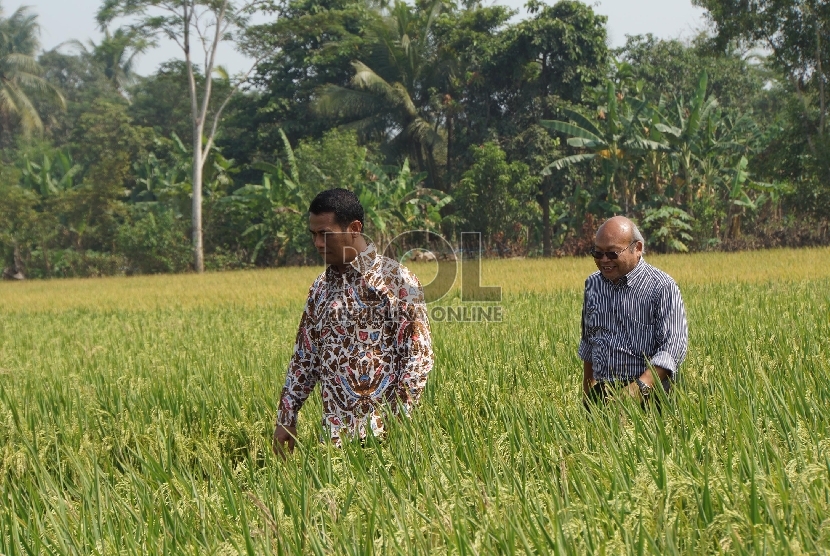REPUBLIKA.CO.ID, KARAWANG -- Agriculture Minister Amran Sulaiman said the on-going drought will not disturb national demand for rice and that the government does not need to import rice.
"Rice stocks will remain secure for the next six months. State-owned logistics board Bulog has 1.7 million tons of rice in stock," the minister said after witnessing a rice harvest in Mekarsari Village, Banyusari Sub-district, Karawang District, West Java, on Friday.
According to Amran, if rice production continues to be boosted from year to year, Indonesia will become self-sufficient in the next three years.
The government has started different programs in order to support its food self-sufficiency scheme. One of the programs is the "1,000 Seed Self-reliant Village Program."
"If the '1,000 Seed Self-reliant Village Program' is continued, Indonesia will be able to export rice," the minister said.
In order to strengthen rice production, the minister said the government has also signed a cooperation agreement with the Bogor-based Institute of Agriculture (IPB) to plant new varieties of rice.
"The seeds of the new variety, which were invented by the IPB, namely the IPB3S, have proven to earn multiple yields," Amran stated.
Local agricultural and animal husbandry services reported that the average rice production in Karawang has only reached 5.1 ton per hectare.
"If superior seeds are used, production could reach 9.4 to 10 tons per hectare," the minister noted.
Meanwhile, Bulog President Director, Djarot Kusumayakti said the El Nino weather phenomenon will continue to impact Indonesia till 2016 and could prolong the ongoing drought, delay the rice harvest season and impede rice supplies.
"It is possible that El Nino's effect will continue till November and remain until the end of the year. If experts confirm such a condition, it will likely delay the harvest season," Djarot said on Friday.
He added that Bulog currently has 1.7 million tons of rice stocks, of which 600 thousand tons are commercial rice and 1.1 million tons are stocked up under the "rice for the poor program (raskin)."
Rice reserves will have to be procured for next year as current stocks won't last, especially since the weather is expected to be dry and could delay the harvest and hurt rice stocks.
"If the harvest season is behind schedule, we must stock up well by the end of 2015. This could result in having to import more rice, as it is a staple commodity," Djarot stated.
On the possibility of the government importing rice, he said he could not make any predictions because the Agriculture Ministry was currently making efforts to overcome the possibility of a delay in the harvest season and the possible effects of drought next year.
"The Ministry of Agriculture has provided assistance in the form of water pumps, retention basins and dam improvement. But the emergence of El Nino is beyond our power. If it runs normally, the grand harvest will take place in March and April, but if El Nino becomes stronger, the harvest will be surely behind schedule," Djarot noted.
According to him, the decision to import was easy as it concerned various interests. Imports should be ordered after careful consideration, including the possibility of it boosting logistical costs involved in the procurement of rice.
"Carrying out imports must be based on the right calculation and negotiations. Apart from that, a large tonnage of ships is needed to transport 50 thousand tons of rice during the month-long loading period. This is something that needs to be calculated and timed well," the Bulog Chief said.


